UNHCR concerned over ending of rescue operation in the Mediterranean
This is a summary of what was said by UNHCR spokesperson William Spindler – to whom quoted text may be attributed – at today's press briefing at the Palais des Nations in Geneva.
UNHCR is concerned over the announcement of the ending this month of the Italian operation Mare Nostrum without a similar European search and rescue operation to replace it. This will undoubtedly increase the risk for those trying to find safety in Europe, and could lead to more refugees and migrants perishing at sea. It is estimated that 3343 people have lost their lives this year while making such journeys, 2755 of them since the start of July.
UNHCR has welcomed Mare Nostrum, which has contributed to the rescue of around 150,000 refuges and migrants since it began a year ago as a response to two tragedies off the coast of Lampedusa, where over 600 refugees and migrants died. Today, UNHCR reiterates its call for Europe to commit more resources to rescue at sea in the Mediterranean.
It is critical that the long-established tradition of rescue at sea is upheld by all. UNHCR also recognizes the efforts made by many commercial vessels - this year alone they have contributed to the rescue of about 37,000 people. To the extent possible, such rescue must ensure minimal financial impact on the shipping industry. Predictability on places for the disembarkation in safety of those rescued is also required.
In addition, Europe needs to step up efforts to provide credible legal alternatives to dangerous voyages to protect people from the risks of traveling with smugglers. The collective response needs to maintain a strong capacity to rescue people at sea and increase safer ways for refugees to find safety in Europe, including enhanced resettlement, other forms of humanitarian admission and private sponsorship schemes. UNHCR is also calling on European governments to do more to facilitate family reunification and use programmes such as student or employment visas to benefit refugees.
The level of desperation among many of those involved, fleeing war, persecution and violence, including from Syria require our concerted efforts to respond. This trend began in June and July last year, before Mare Nostrum was established, and has continued in 2014. In addition, an increased number of women, children, including many unaccompanied, and elderly people are taking to dangerous sea routes. They face greater risks, are more vulnerable to abuse and have specific needs that require assistance after they are rescued.
These challenges cannot be addressed by a few states alone; a joint European response is needed, based on collaboration among states and EU support. These efforts also need to ensure additional initial reception facilities, adequate reception conditions, assistance in processing as well as identifying solutions for those in need of international protection
For more information on this topic, please contact:
- In Rome, In Rome, Carlotta Sami on mobile +39 335 679 4746
- In Rome, Federico Fossi on mobile +31 349 0843461
- In Geneva, William Spindler on mobile +41 79 217 3011
Related news and stories
First UNITY Cup shows the power of football to connect refugees and hosts
Scholarships in Italy allow refugees to dream again
Relief for asylum seekers offered a new life outside Libya
Evacuation flights from Libya to Italy bring hope for vulnerable asylum seekers
UNHCR and Council of Europe discuss statelessness, urge States to uphold the right to a nationality in Europe
UNHCR warns of mounting refugee and migrant deaths in the Central Mediterranean
-
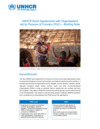
UNHCR Grant agreements with organizations led by displaced and stateless persons - Briefing Note
10 Dec 2021 The new UNHCR Grant Agreement for organizations seeks to ensure that displaced and host communities are treated as equal and active partners. It provides grant funding to organizations led by displaced and stateless persons in order to empower them to realize their own projects and build their capacity. It also allows UNHCR to work directly with the people it serves without having to use intermediaries. -
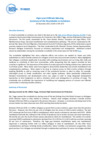
Summary of Roundtable 5: Solutions
10 Dec 2021 This document summarizes the roundtable on solutions, the fifth of a series of five preparatory roundtables to be held in the lead-up to the High-Level Officials Meeting. -

Deadly clashes over scarce resources in Cameroon force 30,000 to flee to Chad
10 Dec 2021 -
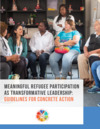
Meaningful Refugee Participation as Transformative Leadership: Guidelines for Concrete Action
10 Dec 2021 This Guidance was drafted by the Global Refugee-led Network in advance of the Global Refugee Forum in 2019. It identifies challenges and gaps to implement refugee participation, while providing guidance on how stakeholders can ensure participation is meaningful. -

Refugee-led innovations during COVID-19
10 Dec 2021 UNHCR dedicated its 2020 NGO Innovation Award to Refugee-Led Organizations (RLO) that developed creative responses to support their communities during the COVID-19 pandemic. Through this Award, UNHCR wishes to showcase the leadership and crucial contributions of these RLOs in supporting their communities, and thus, demonstrate the need to expand and strengthen our partnerships with them. This publication features the work of 20 organizations, including the 7 winners. -
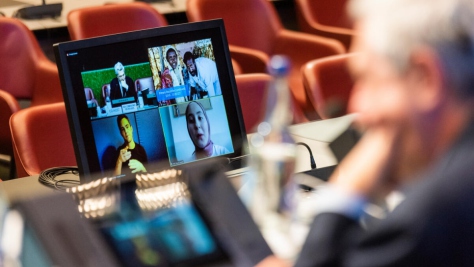
Document library
-
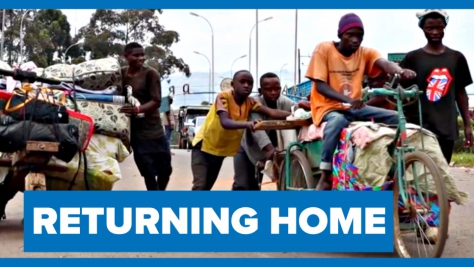
Congolese refugees torn between returning home or remaining in exile
9 Dec 2021 -

Linked and side events for GCR stakeholder groups and initiatives
9 Dec 2021 Timetable for the linked events and side events, which are being held virtually on 13 December for GCR 2021 stakeholder groups and initiatives. -

Amid rising needs, partners seek US$1.79bn for Venezuelan refugees and migrants
9 Dec 2021 Joint UNHCR/IOM Press release
